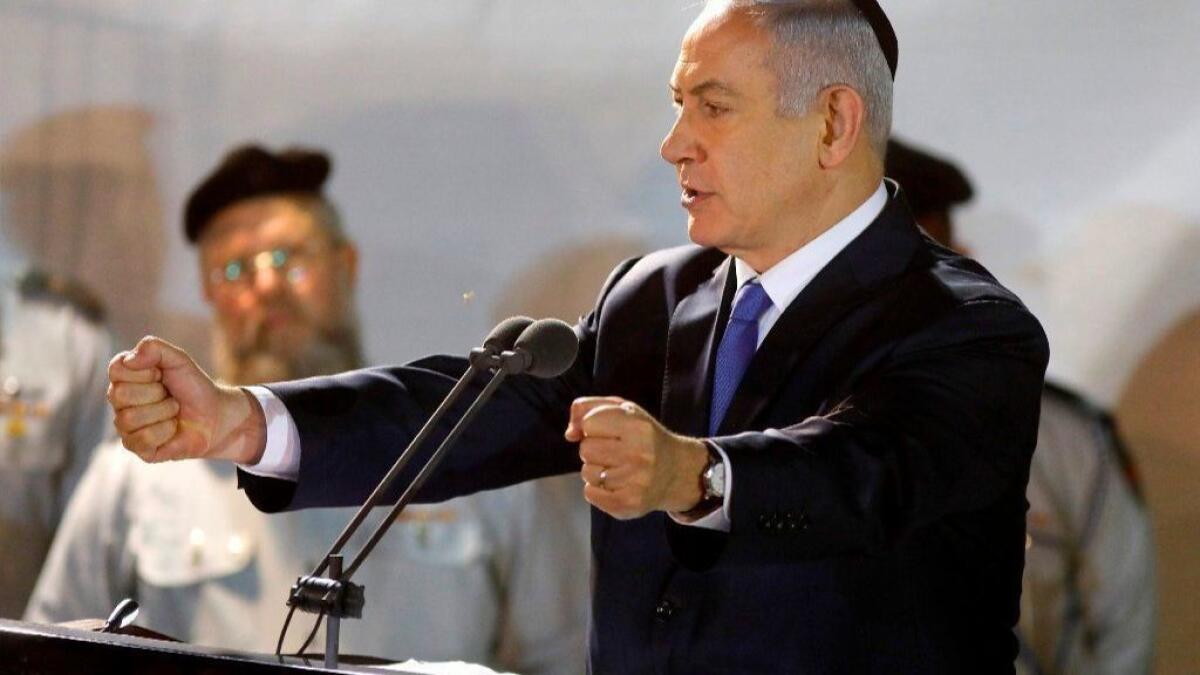Israel’s Netanyahu, consummate political survivor, faces voter test and legal peril

- Share via
Reporting from Jerusalem — In Israeli politics, Benjamin Netanyahu has long been known as the ultimate survivor. But now, a leader who has so often seemed invincible faces grave legal and electoral peril.
With crucial parliamentary elections set for Tuesday, the smooth-talking, American-educated prime minister faces a vote that is widely seen as a referendum on him making controversial moves. On Saturday he pledged to annex Jewish settlements in the occupied West Bank if re-elected, a dramatic policy shift apparently aimed at rallying his nationalist base.
If the election keeps him in power, Netanyahu, 69, will hit a political milestone later this year, becoming Israel’s longest-serving prime minister, a distinction held until now by founding father David Ben Gurion. But with a criminal indictment on corruption charges hanging over his head, that historic marker might carry a very large asterisk.
A polarizing, paradoxical figure, Netanyahu is the sort of politician who’s sometimes down but never out — at least not for long. He’s a onetime elite commando in a state whose military might is still central to its identity. He’s admired by many as a canny political operative, but unreservedly trusted by few.
He has long been willing to form alliances across the political spectrum to maintain power. That fluidity — considered raw opportunism by some — is once again at play in Tuesday’s elections, analysts say.
“It is true that Netanyahu changes with every term in office,” said Reuven Hazan, a political science professor at Hebrew University. “He is not ‘the same’ Netanyahu.”
On Thursday, five days before facing voters, the Israeli leader was on what amounted to a campaign stop — in Moscow, where he thanked Putin personally for Russian troops’ assistance with the repatriation of the remains of an Israeli soldier, Zachary Baumel, killed almost 37 years ago in the first of Israel’s two wars with Lebanon. Such homecomings of remains are rare, and tend to resonate very strongly with the Israeli public.
It was in some ways a rerun of last month, when Netanyahu, reprising a familiar role, played the grateful beneficiary of a political gift from President Trump — this time, the White House declaring that the United States would reverse decades of policy and recognize Israeli sovereignty over the Golan Heights, the strategic plateau seized from Syria in 1967.
Although Netanyahu’s rightist Likud party has long been the country’s dominant political force, its main rival — the new centrist Blue and White party, spearheaded by former military chief Benny Gantz — has also been polling strongly throughout the campaign.
The final preelection polls, released Friday, showed Blue and White with a slight lead over Likud, but also suggested that a bloc of right-wing parties would be better positioned than the centrists to form Israel’s next government.
Experts urged caution. “The polls are simply not right,” said Hebrew University’s Hazan. “The only thing we know is that in every Israeli election, we get a surprise.”
Camil Fuchs, the veteran pollster for the Haaretz newspaper, said this was the most difficult election to predict since 1996, when Netanyahu first came to power.
He served for three years, then returned to office in the spring of 2009 and has held the job ever since, surviving four elections.
Israeli politics are rarely a pretty sight, but this campaign has been distinctive for its divisive tone. In the final days before the vote, a Likud video highlighted a shaky interview performance by Gantz, sarcastically captioning wild-eyed shots of him as “completely stable.” That was reminiscent of an election-day video in 2015, when Netanyahu warned of Israeli Arab voters turning out “in droves” to support his rivals.
Gantz, in turn, has hammered Netanyahu as fatally tainted by the graft scandals for which he faces imminent indictment. The whiff of scandal has for years been a constant in Netanyahu’s public life, but only now is he facing what appears to be genuine legal peril.
In February, Atty. Gen. Avichai Mandelblit announced that Netanyahu would be indicted on corruption charges pending a July hearing in which he will be given a final opportunity to present any exculpatory evidence.
The prime minister stands accused of improperly accepting expensive gifts for political favors, ordering government action aimed at hurting one newspaper in exchange for favorable coverage from one of its competitors, and helping his friend get regulatory concessions for his telecommunications company.
But unless he is convicted, Netanyahu could remain in office. No law prevents him from serving while under indictment or on trial, but Israel has never faced such a situation, and he would almost certainly face legal challenges over his fitness to serve.
In language familiar to American political watchers, he has proclaimed innocence and denounced the legal steps against him as a “witch hunt.”
How ordinary people feel about Netanyahu — who is widely known by his nickname, Bibi — has overshadowed debate of actual policy issues such national security, growing income inequality and whether Arab Israelis have the same rights as Jewish ones.
“Netanyahu is doing terrible things to this country,” said Rachel Laskar Feldman, who teaches French at Hebrew University. “For the past 10 years, I feel that my mission has been my students, Arab students, Jewish students, all my students, and through language we all open our hearts to each other. He’s a wrecking ball.”

Asher Turgeman, 60, has known Gantz since they attended boarding school together and still keeps his private cellphone number handy. But he still planned to vote for Netanyahu.
“Look at what he has done for Israel,” said Turgeman, who drives a taxi. “Look at the economy, diplomacy, look at the heights he’s brought us to.”
He called the prime minister “the most persecuted leader in human history.”
The vote is something of a free-for-all, with more than 6.3 million voters eligible to cast ballots for more than 40 parties, an eclectic mix of established blocs and fringe movements. The number of representatives each party sends to the 120-seat parliament, or Knesset, depends on its total share of the vote.
The field is expected to be drastically winnowed — parties with less than 3.25% of the vote get no seats — but no one party is expected to garner an outright majority, meaning the bigger parties have to ally themselves with smaller ones in order to form a coalition. With Likud holding 30 seats, Netanyahu currently leads through such an arrangement.
Israeli analysts believe that if granted a winning hand at the polls, Netanyahu will attempt to establish a new coalition with politically weak extremist parties who will help pass a law granting him immunity from prosecution as long as he remains prime minister.
In February, Netanyahu brokered a deal between three extreme right-wing parties that include candidates advocating Jewish supremacy. But if he tries to bring them into any new government, he could face a rebellion in the Likud ranks.
“I am afraid we’ll awaken Wednesday morning with Bibi in place, with a very, very, very, very right-wing government,” said Christoph Schmidt, a philosophy professor at Hebrew University.
Netanyahu’s political persona has traditionally centered on security; he likes referring to the Mideast a “tough neighborhood.” That translates into a consistently hard line toward the Palestinians that has only hardened in the run-up to this vote.
Throughout the campaign, he has warned Israelis of “the Arabs,” including a constant jingle that featured the line “It’s Bibi or Tibi,” a reference to veteran legislator Ahmad Tibi, a leader of the Arab Movement for Change party. Israeli Arabs make up a fifth of the population.
“I don’t take it personally,” Tibi said. “It is his way of dividing between an Arab and Jew and it’s another awful, racist statement meaning that in his eyes we are not only second-class citizens but second-class voters.”
Feverish media coverage in Israel depicts these elections as deeply consequential. But Schmidt, the philosophy professor, said a similar sense of urgency has hovered over almost all Israeli polling.
“Every time,” he said, “we think that everything is at stake.”
Special correspondent Tarnopolsky reported from Jerusalem and staff writer King from Washington.
More to Read
Sign up for Essential California
The most important California stories and recommendations in your inbox every morning.
You may occasionally receive promotional content from the Los Angeles Times.










